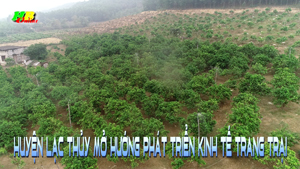
(HBO) - Lac Thuy district has an agricultural land area of more than 5,450 hectares (accounting for 18.6% of the total area of the district) and the forestry land area with forests is over 12,760 hectares (accounting for 43.51%). Lac Thuy is considered as a locality with potentials for land, climate and labor, which are favorable conditions for the district to direct and orient people to invest in developing farm economy.
Up to now, there have been 75 out of 85 farms meeting the criteria for certification, accounting for 81% in the whole district. They include 44 comprehensive farms, 10 cultivating farms, 3 forestry farms, 23 husbandry farms, 5 aquaculture farms. The majority of farms are well-invested with a large scale and high sustainability, contributing positively to job creation and raising income for the people.
Mr. Ngo Dinh Tam, the head of the Agriculture and Rural Development Department of Lac Thuy district, says that since 2006, the People's Committee of the district has proposed a project to develop farm economy, focusing on supporting interest rates for people to borrow investment capital. The district has also built some models of cultivation and husbandry as a basis for replication. Accordingly, the different types of farms have contributed to the local economic development.
Over the past years, the district has been supporting people to build a comprehensive farm economy. This is a kind of stability, ensuring safety and bringing high income for the people. The district has encouraged and created favorable conditions in terms of mechanisms and policies to help people invest in the strong development of industrial husbandry, farm and family husbandry. The concentrated husbandry farms are step by step being formed, creating a large amount of output, significantly contributing to raising awareness about food hygiene and safety, promoting the process of restructuring husbandry, creating jobs and increasing incomes for the people. A lot of farms have earned from hundreds of million to billions of dongs every year.
In the coming time, the Party Committee and the government of Lac Thuy district are attaching great importance to orientation helping the farm owners to see clearly the number one goal is the safe production and the second one is the good implementation of the traceability and the higher is building the products meeting Vietgap standards to gain a foothold in the domestic supermarkets, proceeding to export.
According to data from the Hoa Binh Provincial Party Committee, the industrial production index for the first six months of 2025 is estimated to have increased by 20% compared to the same period last year. This marks the highest year-on-year growth rate for this period since 2020.
In the first six months of 2025, Hoa Binh province’s export turnover was estimated at 1.145 billion USD, marking an 18.11% increase compared to the same period in 2024. Import turnover was estimated at $ 804 million, a 17.15% increase, which helped the province maintain a positive trade balance.
The lives of the ethnic minority farmers in Tan Lac district have gradually improved thanks to the new directions in agricultural production. This is a testament to the collective strength fostered through the professional associations and groups implemented by various levels of the district’s Farmers’ Union.
With the motto the "product quality comes first,” after nearly one year of establishment and operation, Muong village’s Clean Food Agricultural and Commercial Cooperative, located in Cau Hamlet, Hung Son Commune (Kim Boi district), has launched reputable, high-quality agricultural products to the market that are well-received by consumers. The products such as Muong village’s pork sausage, salt-cured chicken, and salt-cured pork hocks have gradually carved out a place in the market and they are on the path to obtaining the OCOP certification.
In the past, the phrase "bumper harvest, rock-bottom prices" was a familiar refrain for Vietnamese farmers engaged in fragmented, small-scale agriculture. But today, a new spirit is emerging across rural areas of Hoa Binh province - one of collaboration, organisation, and collective economic models that provide a stable foundation for production.
Maintaining growing area codes and packing facility codes in accordance with regulations is a mandatory requirement for agricultural products to be eligible for export. Recently, the Department of Agriculture and Environment of Hoa Binh province has intensified technical supervision of designated farming areas and packing facilities to safeguard the "green passport" that enables its products to access international markets.


